IDEA Hacks is the premier hardware-focused hackathon on the West Coast. Hosted by IEEE’s Student Branch at UCLA over 36 hours on January 12-14, it provided hundreds of students from UCLA and local community colleges with an opportunity to develop their own tangible products. Throughout the experience, the organizers provided parts, tools, space, food, and workshops all for free, so these students could focus solely on their projects.
This year marked the 10th anniversary of IDEA Hacks, and the theme — “Celebrating Our Communities” — encouraged students to embrace their unique backgrounds and create something that will improve or benefit their communities, surroundings, and environments. The three subcategories were Sustainability, Accessibility, and “Go Touch Grass,” aimed to promote the creation of projects that will benefit the health of the planet, improve accessibility, or share the enjoyment of life.
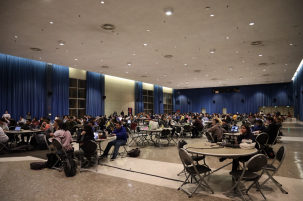
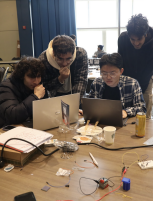
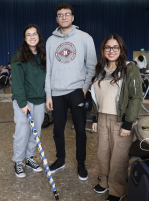

Attendance
IDEA Hacks reached a diverse audience, with 290 applicants this year coming from a wide range of backgrounds. Approximately 230 students competed, with a total of 40 projects across 40 teams submitted for judging.
There were a record number of 32 community college students who attended from El Camino College, Santa Monica College, Cerritos College, Los Angeles Pierce College, and East Los Angeles College.
The students attending IDEA Hacks had diverse technical backgrounds, different levels of hands-on experience (purely electrical to purely mechanical knowledge), and years of project experience to students only getting started in engineering. Idea Hacks supports students of all backgrounds with multiple technical workshops and abundant technical support from volunteers to ensure that as many students as possible can learn and have a valuable experience. Partnerships with other student organizations helped increase diversity in the event’s leadership and included the following organizations:
- American Society of Mechanical Engineers (ASME)
- IEEE Women Advancing Technology through Teamwork (IEEE WATT)
- Association for Computing Machinery Hack (ACM Hack)
- UCLA’s Game Music Ensemble (GME)
- Bruin Chamber Musicians (BCM)
There were 13 judges composed of industry representatives, faculty, and UCLA alumni who judged the 40 submissions over two rounds.
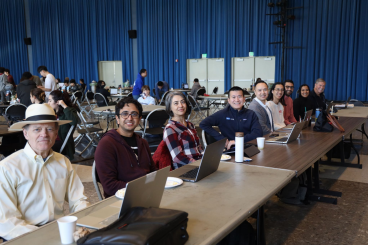
Winning Projects
The judges were impressed by all of the students’ projects. A complete list of final submissions is available on the Devpost (https://idea-hacks-2024.devpost.com/project-gallery), but below are the winners:
First Place Overall: Echo Location
Team members: Jacob Levinson, Adrian McIntosh, Preston Futaba, Daniel Yang
Devpost: https://devpost.com/software/echo-location-bez8d2
Presentation: Link Coming Soon
Description: The device detects nearby obstacles and informs the user of their presence using gentle and proportional vibration in the direction of the obstacles. When the user moves closer to the obstacles, the vibration in that direction will increase, warning the user they will soon bump into it. This can be used to detect people, walls, other obstacles, and also the lack of such obstacles in each direction.
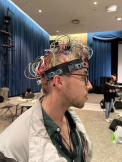
Second Place Overall: The Seeing Eye Vest
Team members: Ava Ankenbrandt, Kush Agarwal, Caitlin Nguyen, Julie Cover
Devpost: https://devpost.com/software/the-seeing-vest
Presentation: Link Coming Soon
Description: The Seeing Eye Vest is a suite of low-cost, open-source hardware and software devices made to help people with seeing, hearing, and motion disabilities navigate the outdoors more easily. The 3D world around the vest is mapped onto the grid — the closer an obstacle gets, the stronger the vest vibrates in a given direction.
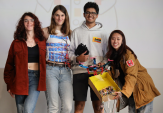
Third Place Overall: Bare Bones D&D
Team members: Getty George V, Drew Gautier, Cameron Fiske, Grant Parker
Devpost: https://devpost.com/software/bare-bonez-dnd
Presentation: Link Coming Soon
Description: Bare Bones uses AI (Arcane Intelligence) to understand what players are saying and keep track of character, enemy health, and stats in addition to planning out the individual encounters that compose full-scale adventures. Players take turns saying what they want their character to do and the skull narrates what happens. Behind the magic, the project converts user speech into text, which is then fed into an OpenAI API call along with other information to direct the response. The response is then received and processed before it is converted to audio and told back to the participants.
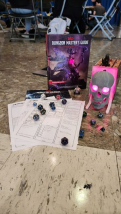
Fun Activities
To change the atmosphere and give the hackers a break, the organizers included the following events:
● Screen Printing workshop by IEEE at UCLA Officers Claire Huang and Jace Fang, teaching students how to screen print designs onto tote bags
● Game Music Ensemble performance who performed energizing music from various familiar video games
● Bruin Chamber Musicians performance who performed relaxing classical music pieces Sponsorships
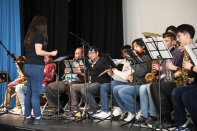
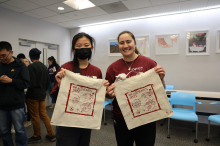
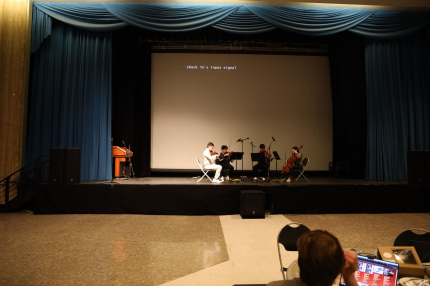
Sponsorships were essential to the success of IDEA Hacks 2024. Beyond providing funds for parts, food, the venue, and other supplies, students loved interacting with sponsors. Talking with corporate partners was one of the most popular components of IDEA Hacks. There were three key sponsors: Digi-Key, Patient Health Safety Initiative, and Optiver.
Future Improvements
This year was the largest and most successful IDEA Hacks ever, with record breaking attendance (including from community colleges) and project submissions. The event ran more smoothly than ever before, with the only delays being in judging, due to the high percentage of the teams successfully finishing their projects. Going forward, the organizers hope to continue to grow and provide this hackathon experience to more and more students everywhere while continuing to provide everything for free. Below are a few initiatives to improve IDEA Hacks in the future:
● Integrate corporate sponsors more deeply: Participants loved networking with corporate sponsors, and the flexibility of donated funds (as opposed to on-campus funds) allows the organizers to improve programming.
● Highlight interdisciplinary learning: The best projects were the ones that integrated electrical engineering, computer science, and CAD. The organizers want to encourage students to form teams with people of various backgrounds and attend workshops that diversify their range of skills.
● Continue to enhance the experience for community college participants: The event had a record number of community college students attend this year and expanded the community college centered experience with panels and mentors. The organizers would
like to continue expanding upon this experience in the coming years.
● Emphasize mental and physical health: The organizers would like to add more structured breaks and fun workshops (music performances, stretching sessions, etc) that provide opportunities for participants to de-stress and learn techniques to keep themselves healthy.
